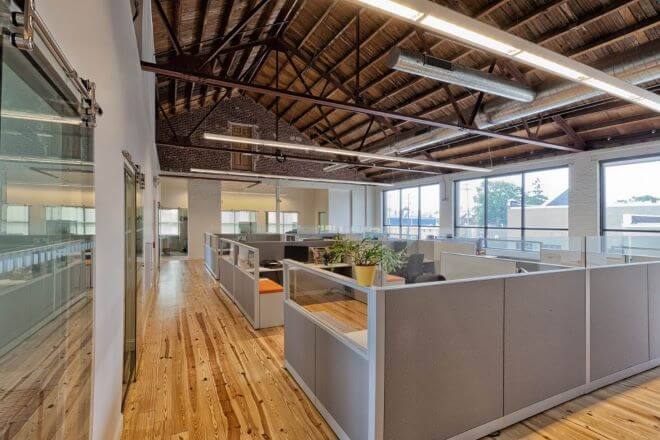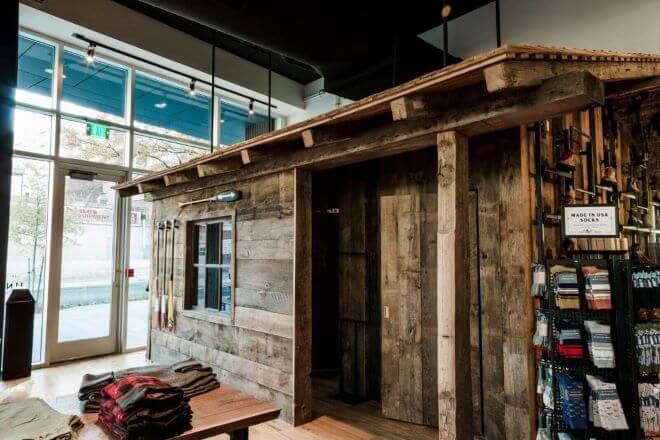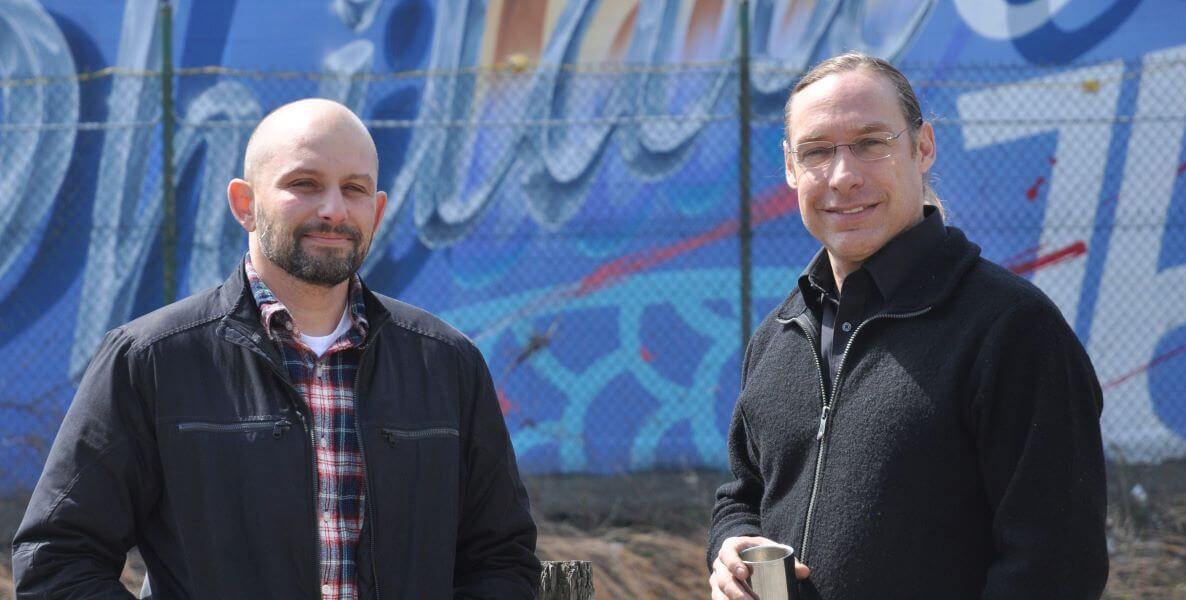When Scott Kelly was a young architect studying in Rome, he was entranced by just how ancient the modern city still remained.
Beyond the ruins from the Roman empire, there were plenty of functional structures from thousands of years ago. There were drinking fountains connected to aqueducts restored under the direction of Pope Nicholas in the 15th century. The Pantheon, built in 125 A.D., was (and is) still used as a Roman Catholic Church. The building along the Italian Riviera where Kelly lived was 1,000 years old.
There to study architecture as part of a 12-week program, he ended up staying nine months. During that time he learned a plethora of lessons about how to adapt and reuse materials from older buildings into new designs.
Today, as founder/principal of Re:Vision Architecture, Kelly still thinks about how salvaged wood and bricks, old walls and windows can be repurposed in new structures. As one of the earliest local practitioners of eco-friendly design, Kelly pioneered sustainable building, and to this day aims to always be one step ahead of the latest environmental standards.
“Part of sustainability has to include beauty, because a product that is not beautiful will not be loved and will not be maintained for very long,” he says. “These are the parts of sustainability that we don’t always talk about … beauty, social responsibility, education.”
Re:Vision has designed more than 1,000 green buildings within and outside of Philadelphia; locally, those include buildings at the Navy Yard, Mariposa Food Co-Op, United By Blue’s flagship store, PECO’s Green Roof on 23rd and Market and lots of homes. Nearly 70 percent of Re:Vision clients are nonprofits.
Kelly’s commitment to sustainable design and thoughtful approach to working with clients have earned him prizes from the Preservation Alliance of Greater Philadelphia, Green Building United, and others.
But first, a road trip
When he got back to the U.S., Kelly realized he wanted to see more of his own country to better understand how to incorporate elements of history into his own designs. So, he “hopped in a Volkswagen bus, lived out of it and drove around the country,” he says.
He ended up taking three more cross-country trips in his Volkswagen: one in 1991, one in ’93 and again in ’96. He’d work for three years, save up, then spend six months traveling across the country. He set a goal of reaching all 50 states by age 50. Now, at age 54, he’s missing only Alaska, Arkansas, Hawaii and North Dakota.
During those trips, he learned a lot about how the environment can affect different habitats, both natural and man-made. When you look at the natural world, he says, you’ll notice that flowers and trees are rarely perfectly symmetrical. Plants will lean toward the sunlight or take root in the flow of water. “Why does the building look the same on all four sides? Nothing in nature looks that way,” he remembers thinking. And he brought those lessons back to his architectural practice.
“Part of what shaped me was being outside understanding natural systems and how to work with some and not against them,” he says. “If my tent is oriented a certain way, I’m going to be warm in the morning and I’m going to be cool in the afternoon. I do the same thing with buildings.”
These experiences made Kelly passionate about the environment, sustainable design and reusing the best parts of old buildings whenever possible. But after working as an architect for 10 years, he’d become frustrated with the industry. Back in the 1990s and early 2000s, few in the industry were focused on designing and building sustainable buildings. Philadelphia had no green building council to speak of. He loved Philly — he once drove back from a barbecue place in Austin, Texas, just because he missed the Italian Market. But he didn’t know if he could pursue his passion for sustainable design in the city.
The best-laid plans

So, he decided to leave and look for architecture jobs elsewhere in the U.S., somewhere that was more friendly to sustainable design. He resigned from his previous firm and planned to spend a month in the city saying good-bye to friends before he moved.
But before he left, a friend approached him and asked if he could design a school. Kelly agreed to design the project and to get it started, but he warned his friend that was all he could do. “I was basically saying to them, I’m moving, [but] I’ll get you started,” Kelly recalls.
That first project turned into many. “The second phone call came, and then the third and fourth, the fifth, and I never got the chance to leave,” Kelly says.
Now, Kelly has become both a local and national leader in the field of sustainable design. In 2001, he helped found the Delaware Valley Green Building Council Chapter with others in the city who were interested in green design. The next year, he founded Re:Vision Architecture, a Manayunk-based green design and sustainability consulting firm with co-founder Jennifer Rezeli.
Stealth sustainability
When Kelly founded Re:Vision, he knew he wanted it to be more than just a business. “Part of sustainability has to include beauty, because a product that is not beautiful will not be loved and will not be maintained for very long,” he says. “These are the parts of sustainability that we don’t always talk about … beauty, social responsibility, education.”
In Re:Vision’s early days, Kelly didn’t tell the contractors he was working with that they were building a LEED-certified project. If he did, they’d charge 10 to 15 percent more for acquiring LEED-certified materials. (LEED is the world’s most widely used green building rating system. It gives buildings points based on energy, water use and materials quality).
Instead, Kelly would ask them to use specific suppliers whose materials he knew to be up to snuff. He’d ask if they could buy drywall from a plant that reused materials from a nearby coal-fired power plant, or if they could use a particular brand of paint that was more environmentally friendly. “I basically was trying to do everything I could in the green, sustainable realm and I just didn’t tell anybody,” Kelly says.
He loved Philly — he once drove back from a barbecue place in Austin, Texas, just because he missed the Italian Market. But he didn’t know if he could pursue his passion for sustainable design in the city.
Since then, the market for sustainable architecture has grown — and so has the company. They added a sustainability consulting practice that helps clients brainstorm ways their buildings can be more environmentally friendly in addition to their design practice. In 2006, Kelly bought a building on Grape Street for Re:Vision’s headquarters. He immediately turned it into a lab of sorts for experimenting with new sustainable design techniques. The building’s rooftop solar panels generate 60 percent of its electricity. In 2013, it achieved LEED Platinum certification. “It gave us the ability to experiment,” Kelly says.
Last year, Drew Lavine, the company’s director of architecture since 2011, joined Kelly as a co-owner of the business and Rezeli left the firm. Lavine helped grow the company from 16 employees to 23 with its architecture and sustainability consulting practices.
Kelly’s goal for each project the firm takes on is to make it at least 50 percent more environmentally-efficient than current building codes. “Code keeps you out of jail, but that’s about it,” he says.
And the firm meets these goals whether it is designing a building from scratch or if they’re adapting an old space. Adaptive reuse is one of Kelly’s favored design techniques, both because it eliminates the carbon footprint generated by using all-new materials and because it can preserve a building’s culture and history. That’s particularly important in Philly, given the city’s abundance of historical structures.

New project, new approach
One recent adaptive reuse project: The Synergis Technologies Headquarters in Quakertown, Pennsylvania. The tech company wanted Re:Vision to transform a sprawling 65,000 square-foot industrial site that once belonged to the Best Made Silk Hosiery Company. Over the years, seven additions had been added to the original building. Re:Vision’s design removed those additions and after they were torn down, repurposed salvageable materials within the interior of Synergis’ offices. Salvaged wood was used to build the reception desk and a series of booths in the company’s cafe. Ground-up brick from the old walls was used to pave the courtyard garden Re:Vision added to the site. The team then added energy efficient lighting and HVAC systems to the historic structure, rounding out a contemporary, sustainable design.
“We repurposed every material we could have from the old building back into this building for beauty,” Kelly says. “We kept what was good and what we could use for a higher and better use.”
In terms of newer constructions, Re:Vision recently designed Muhlenberg College’s new Parkway Boulevard Building. The project will include rooftop solar panels, rainwater collection systems and native landscaping. The site will also include bike shelters and electric car charging stations to encourage people to use low- or no-carbon forms of transportation.
The building is situated on top of a hill on the campus, rather than at the bottom in order to keep it away from water flowing downhill that could damage the structure. A lesson Kelly brought with him from his days camping across the country: “When you’ve got to put a tent in the ground to stay alive, you tend not to put it in the flow of water,” he says.
To measure how sustainable Re:Vision’s designs are, the firm uses certification systems. The best-known system they use is LEED certification, but they also work with Living Building Challenge, a program that strives to make buildings with net-positive energy use — meaning they generate all the energy they need and have enough to share with neighboring buildings. These designs also have closed-loop water consumption, which capture rainwater and use it to flush toilets, run faucets and meet other needs within the building.
The firm has worked on almost 500 LEED-certified projects, many of them Platinum (LEED’s highest achievement level) and 12 Living Building Challenge Projects. Muhlenberg’s Parkway Boulevard Building will be one of the first 20 projects in the world to achieve Living Building Challenge’s CORE green certification, which means it will generate most of its own energy and water, but may not have enough to share with a neighbor.
Kelly didn’t share exact revenue figures, but said that the company has been profitable for the entire 20 years it’s been in operation. For him, the business’s success is determined by the good they do for the community, not just how much money they make. The company has been a founding B Corp since 2007 and last year they earned their Just Label, which helps ensure businesses are acting in a socially just and equitable manner.
Collaboration at the core
As the business has matured, Kelly and Lavine have focused on sharing their knowledge, doing good for the community and expanding the national sustainable design movement. They’ve mentored local contractors and developers on green design and they’ve helped other companies achieve their B Corp certification and want to expand on these efforts and help more companies both locally and in other states. “My mission is to help the rest of the industry,” he says.
Kelly’s goal for each project the firm takes on is to make it at least 50 percent more environmentally efficient than current building codes. “Code keeps you out of jail, but that’s about it,” he says.
He’s also focused on using Re:Vision’s work to help nonprofits. One example is Horizon House, a West Philly nonprofit that helps people experiencing homelesness and / or mental health issues. Re:Vision’s design for their headquarters in the New Market West building on 59th and Market included sustainable, low-carbon interior materials, an elimination of PVC products, which are made using the toxic chemicals chlorine and dioxin, and access to daylight for every single workstation — something Horizon’s old headquarters lacked. The project was a finalist for the Green Building United Groundbreakers award.
Horizon House came to work with Re:Vision after evaluating several other architectural firms for the project. What they liked about Re:Vision was their willingness to seek out perspectives from senior leadership, staff and participants before working on a design.

Other firms tried to start with models based on what had worked for other nonprofits they designed. Re:Vision started the process by listening to what the people who worked at Horizon House wanted and needed from their space. The architects met with staff members and participants in Horizon House’s programs and incorporated their feedback into the final design.
“It didn’t start with here’s a model it started with, here’s a blank piece of paper. Let’s talk about what you want,” says Jeff Wilush, President and CEO of Horizon House.
What these discussions found was that staff was longing for an environment where they could see the sunlight. Their old building had few windows and everyone was siloed into different offices. Re:Vision created a flexible, open space complete with walls and furniture that can be easily disassembled and reassembled, so staff can create more private areas when needed.
Each workstation receives sunlight everyday. Re:Vision added a staff-requested quiet room where people can go to take a break from work or to decompress after a stressful meeting.
“What Re:Vision wanted to pitch to us was just keeping a very open environment, letting everybody see the sun coming through the windows,” Wilush says.
![]() MORE FROM THE CITIZEN ON SUSTAINABILITY
MORE FROM THE CITIZEN ON SUSTAINABILITY
MOST POPULAR ON THE CITIZEN RIGHT NOW
Scott Kelly and Drew Lavine


